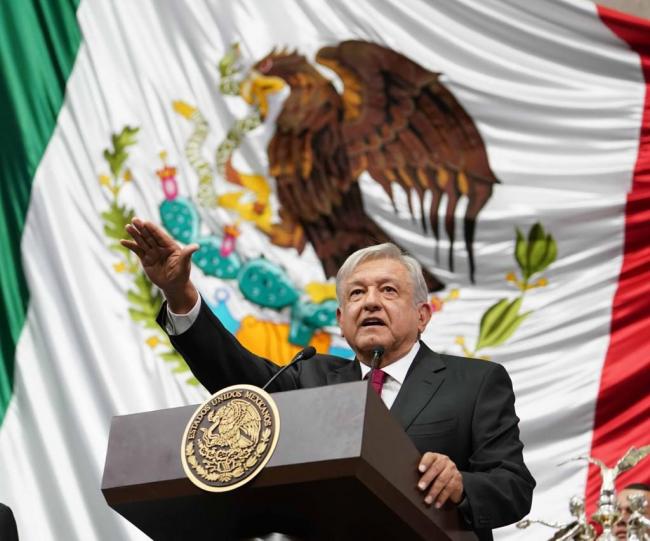by LAURA CARLSEN
 Andrés Manuel López Obrador at the presidential inauguration in Mexico City on December 1, 2018. PHOTO/AMLO
Andrés Manuel López Obrador at the presidential inauguration in Mexico City on December 1, 2018. PHOTO/AMLO
Andrés Manuel López Obrador was inaugurated Saturday, in a ceremony unlike any other seen in Mexico. What’s next for the new president?
In over two centuries of nationhood, Mexico has never seen a presidential inauguration like that of December 1, 2018. From the pre-dawn Indigenous ceremony to consecrate the bastón de mando—a wooden staff symbolizing government—that representatives of Mexico’s Indigenous peoples would later present to the new president, to the cultural festival that lasted into the night, Andrés Manuel López Obrador broke down pomp and circumstance and promised a new form of government. His most oft-repeated phrase: “I will not let you down.”
López Obrador began the day taking the oath of office in the Congress, as Porfirio Muñoz Ledo, president of the Congress, historic dissident politician and member of AMLO’s MORENA Party (Movement for National Regeneration), handed him the presidential banner. Former president Enrique Peña Nieto sat sour-faced and clearly uncomfortable on the congressional podium as the new president thanked him for not interfering in the elections, referring to the multiple frauds committed by Peña’s long-time ruling party, the PRI, in previous elections.
The Left has been robbed of electoral victory in Mexico twice in recent history. Once in 1988, with the candidacy of PRI dissident Cuauhtémoc Cárdenas, and again in 2006 when authorities recognized conservative Felipe Calderón by half a percentage point and refused the demand for a broad recount of the vote. Manipulation, fraud, vote-buying, and media favoritism has long been the formula for gaining the presidency in Mexico’s past, particularly during the 71-year uninterrupted rule by the PRI. Inaugurations became formal acts that inspired real enthusiasm mainly among those who took power, in a system designed to transfer wealth and power to the wealthy and powerful.
On Saturday, more than 160,000 people from across the country gathered in the city’s central plaza to watch AMLO become president of Mexico. After a prolonged five-month transition period, and decades of corrupt rule, they had waited a long time. The Zócalo began to fill by morning, although AMLO would not arrive until after 5:00 PM.
When asked what they expected, most people replied with some version of “Everything is going to change.Talking to people in the Zócalo reaffirmed the astonishing change in Mexican political culture that occurred in the July 1 election. When asked what they expected, most people replied with some version of “Everything is going to change.” A woman from Iztacalco, Mexico City, said she expects increased employment under the new government. “We need jobs for everyone. With jobs, everything else works out.” She said her whole neighborhood came down early in the day “so we don’t miss anything.” There were balloons against a perfectly clear blue sky, music, cardboard masks of a beaming Lopez Obrador and a scowling Peña Nieto, often worn by side by side. The old and the new. The past and the promise.
López Obrador has done what seemed impossible in the encrusted Mexican political system: He created a sense of identification with the Mexican people. For most, voting had always been a choice between the lesser of evils, and the presidency a platform for personal enrichment, possible repression and, at best, six months of campaign followed by six years of neglect.
